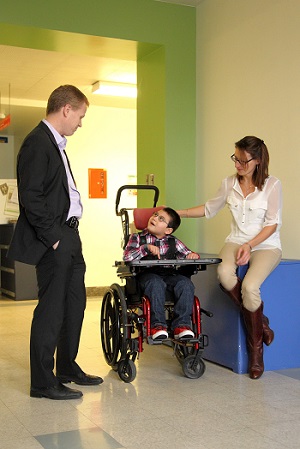Brain surgery saves six year old from daily seizures
 When you’re faced with a difficult challenge, you can either become bitter or better. It’s a thought that often crosses Nathalie Richard’s mind. Luckily for her and her family, she has always chosen the latter.
When you’re faced with a difficult challenge, you can either become bitter or better. It’s a thought that often crosses Nathalie Richard’s mind. Luckily for her and her family, she has always chosen the latter.
When she was 32 weeks pregnant, Richard's son David had a stroke in her womb. Her doctor at the Royal Victoria Hospital referred her to the Montreal Children’s Hospital, where she met neurosurgeon Dr. Jeffrey Atkinson. Then at two months old, Dr. Atkinson had David undergo an MRI, and the results confirmed a severe brain malformation on his right side. A month later, David began to seizure and was diagnosed with cerebral palsy and epilepsy. “The first year was the worst. It was bad news after bad news,” admits Richard.
David was also declared legally blind and he developed gastroparesis, which causes partial paralysis of the stomach and an inability to digest. Doctors had to insert a gastric tube into his nose to feed him. “The fact that my son couldn’t eat really bothered me,” says Richard. “I dealt with his inability to walk and talk, but eating is just so natural and he couldn’t do it.” At the age of two, David’s doctors removed the tube from his nose and inserted a gastrostomy tube into his stomach.
The longest day
Then last winter, his seizures started to get worse – much worse. David’s doctors tried switching his medication to stop the seizures but it didn’t work. Eventually David was having up to 60 seizures a day. At this point, Dr. Bernard Rosenblatt recommended brain surgery for David.
In March this year, Dr. Atkinson and Dr. Jean-Pierre Farmer operated on David for 13 hours, performing a right-functional hemispherectomy and complete corpus space callosotomy. “In order to control his epilepsy we cut all the connections between the right and left side of the brain to prevent the damaged, epileptic right side from affecting the more normally functioning left side,” explains Dr. Atkinson. After a long and stressful wait, Richard and her family received word that the operation was a success. The hope was that David would be seizure-free.
A new life for David
Since his brain surgery, Richard has noticed a big change in her son. Most surprising is that David can now eat on his own. “He can actually hold a spoon and feed himself,” she says. “It’s the first time in his life that he’s experiencing different flavours and textures. He just wants to eat all the time!”
David is also physically stronger which allows him to sit straighter and crawl on all four limbs. His speech and vocabulary have improved too. “He’s talking more and using different words to express himself,” explains Richard. “Instead of being constantly drained from all the seizures, he can now sit and read a book.” David is also more social now and has developed a strong connection with his classmates at school. “Before the surgery, David didn’t really seem interested in the kids in his class, but now he talks about them all the time," says his mother.
Inspired by her son, Richard has decided to start her own non-profit group to help support parents whose children have recently been diagnosed with a disability. “I can truly say that I am at peace now. I hope I can help other parents,” she says. “I wasn’t ready to lose David and I’m so thankful we did this surgery. It gave me a second chance with David and it gave us a chance at a normal life. We finally have a day-to-day routine and it feels great.”
